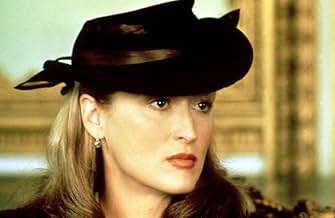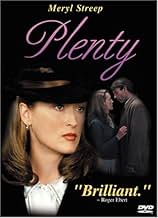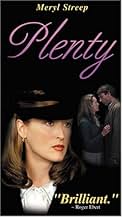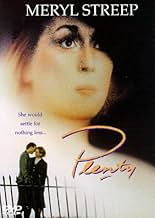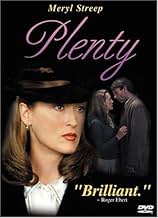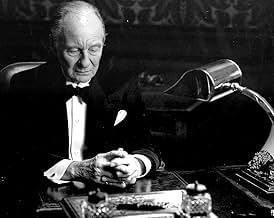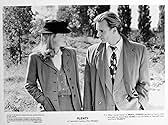NOTE IMDb
6,0/10
3,5 k
MA NOTE
Une jeune Anglaise passe vingt ans à se construire une vie, aux dépens de son entourage, dans l'Angleterre de l'après-guerre.Une jeune Anglaise passe vingt ans à se construire une vie, aux dépens de son entourage, dans l'Angleterre de l'après-guerre.Une jeune Anglaise passe vingt ans à se construire une vie, aux dépens de son entourage, dans l'Angleterre de l'après-guerre.
- Nomination aux 2 BAFTA Awards
- 2 victoires et 5 nominations au total
André Maranne
- Villon
- (as Andre Maranne)
Avis à la une
"Plenty" is a film I watch as often as other people watch "It's A Wonderful Life" or the first "Terminator", yes, I know, I must be a very strange guy. I was a teenager when I saw "Plenty" on stage at the National Theater in London. I remembered the play vividly, Kate Nelligan's performance was sensational. Fred Schepsi's "Plenty" has a totally unique life of its own. We're allowed into Susan's mind and Susan has Meryl Streep's face. Her performance makes her character's intellect visible, cinematic. Intimidating, fascinating, extraordinarily beautiful performance. I think David Hare has written here one of the best female characters I've ever seen and Meryl Streep strips it of every pretense. She can lie even to herself but not to us. It is mesmerizing at times. A ping pong ball going through the character's brain as she listens. Alone, so alone in the world. She never expresses it with words although she, I think, is totally aware of it. The infuriating sense of being incapable to adapt, to belong. Wanting and not wanting. Mesmerizing! As if this wasn't enough, Tracey Ullman, Charles Dance, Sting, Ian McKellen and John Gielgud giving, perhaps one of the best film performances during the final part of of his life I felt rather lonely in my love for this film until I started reading some of the comments posted here and realized I wasn't all alone in the world. Nice to meet you all.
PLENTY cast such a spell on me. It is one of those films which has a mood and tone all of its own. It is sombre, dreamy and elegaic. And it features a little seen, yet compelling and masterful central performance from Meryl Streep, who lights up the screen with the type of intelligence and female strength one laments the absence of in contemporary film.
Based on David Hare's play, PLENTY (like so much of his work) boasts wonderfully complex, multi-layered roles for women. Meryl Streep and Tracey Ullmann excel with the intelligent dialogue given to them by this incredible writer - and despite the plethora of strong male actors surrounding them, it is the women whose stories move and interest us the most.
What I love about PLENTY is that so much about it is anti-Hollywood. Its convoluted plot is often incoherent and dreamlike, its dependence upon memories and the co-existence of past and present present challenges for audiences who normally would be sign posted in the 'correct' direction. It has an impressionistic, hypnotic feel, and the film's characters, especially Susan, are unappologetic and potentially dislikeable people. Its narrative resoultion is ambiguous, refusing the closure of more traditional dramas. Here we have a film which refuses to pander to the demands of the mainstream, and for that it is to be applauded.
Is there anything new that any of us can say about Meryl Streep??? This is a must for admirers of the actress, and a must for anyone with a penchant for riveting, deeply intelligent acting. Meryl grabs the part by the throat, investing Susan with a compelling defiance, a fierce intelligence, a sensuality, and a restrained beauty. Watch out for the dinner party scene. I forgot there was anyone else in the room (a room which included Sir John Gielgud and Charles Dance!) Such command, such depth, and such naturalness. This is an actress of phenomenal depth and magnificent expression. And such wonderful chemistry with the other actors! (Even Charles Dance who reportedly was a bit of a diva on set!! I wonder if this helped to enhance the fiery antagonsim between them on screen?)
In sum, PLENTY is deeply complicated, but give it time, watch it more than once and you will be rewarded. For its thoughtful direction, its searing, intricate dialogue and its mesmerising acting - this is a film that deserves to be seen by much larger audiences. Bravo Queen Meryl!!
Based on David Hare's play, PLENTY (like so much of his work) boasts wonderfully complex, multi-layered roles for women. Meryl Streep and Tracey Ullmann excel with the intelligent dialogue given to them by this incredible writer - and despite the plethora of strong male actors surrounding them, it is the women whose stories move and interest us the most.
What I love about PLENTY is that so much about it is anti-Hollywood. Its convoluted plot is often incoherent and dreamlike, its dependence upon memories and the co-existence of past and present present challenges for audiences who normally would be sign posted in the 'correct' direction. It has an impressionistic, hypnotic feel, and the film's characters, especially Susan, are unappologetic and potentially dislikeable people. Its narrative resoultion is ambiguous, refusing the closure of more traditional dramas. Here we have a film which refuses to pander to the demands of the mainstream, and for that it is to be applauded.
Is there anything new that any of us can say about Meryl Streep??? This is a must for admirers of the actress, and a must for anyone with a penchant for riveting, deeply intelligent acting. Meryl grabs the part by the throat, investing Susan with a compelling defiance, a fierce intelligence, a sensuality, and a restrained beauty. Watch out for the dinner party scene. I forgot there was anyone else in the room (a room which included Sir John Gielgud and Charles Dance!) Such command, such depth, and such naturalness. This is an actress of phenomenal depth and magnificent expression. And such wonderful chemistry with the other actors! (Even Charles Dance who reportedly was a bit of a diva on set!! I wonder if this helped to enhance the fiery antagonsim between them on screen?)
In sum, PLENTY is deeply complicated, but give it time, watch it more than once and you will be rewarded. For its thoughtful direction, its searing, intricate dialogue and its mesmerising acting - this is a film that deserves to be seen by much larger audiences. Bravo Queen Meryl!!
9RG-5
"Plenty" needs to be seen on a big screen in a theatre; more than most, this is a film that suffers in its translation to a TV screen. (Among other things, there are scenes that are simply ruined in the format change--like the hilarious scene of Streep and Sting on a sofa as Queen Elizabeth's coronation plays live on the tellie!) Sound is also important to fully appreciating the film--like the constant reminders of the sound of opening parachutes that echo throughout the story.
It's easy to understand why the film was not a box office success; it focuses on a woman who is not terribly likeable, but I contend that it is a movie rich in observations that transcend post-war Britain and the borish woman who develops in that milieu. "Plenty" is (among other things) about passion, diplomacy, memory, self-deception and the great expectations that are so easily squashed in our unheroic modern world. The film (and Hare's play before it) revolves around a crucial scene brilliantly played by a startlingly mad Streep and Ian McKellan's icily insightful foreign service officer--well past the film's mid-point. After his long-in-coming dose of reality, Streep's Susan takes a tailspin into the movie's melancholy conclusion. It's not an easy film to "enjoy," but the uniformly brilliant performances from Streep, Charles Dance, Tracy Ullman and John Gielgud make the film fascinating to watch and rewarding to have experienced.
It's easy to understand why the film was not a box office success; it focuses on a woman who is not terribly likeable, but I contend that it is a movie rich in observations that transcend post-war Britain and the borish woman who develops in that milieu. "Plenty" is (among other things) about passion, diplomacy, memory, self-deception and the great expectations that are so easily squashed in our unheroic modern world. The film (and Hare's play before it) revolves around a crucial scene brilliantly played by a startlingly mad Streep and Ian McKellan's icily insightful foreign service officer--well past the film's mid-point. After his long-in-coming dose of reality, Streep's Susan takes a tailspin into the movie's melancholy conclusion. It's not an easy film to "enjoy," but the uniformly brilliant performances from Streep, Charles Dance, Tracy Ullman and John Gielgud make the film fascinating to watch and rewarding to have experienced.
This is one film which has grown on me since I saw it on main circuit. It is an intelligent film, which demands a lot of active viewing. Aided with an incisive script by David Hare, it looks at Britain's history from the end of WWII, through to Queen Elizabeth's coronation the Suez Crisis, all counterpointed by the lead character, Susan Treherne (played, in I think one of her best moments, by Meryl Streep.) The film plays on the word "Plenty" and the hope for UK after WWII that there would be plenty - in itself ironic. It is also a study of a woman afflicted by bipolar disorder (manic-depression). This is not the focus of the film; in fact, it is never explicitly stated.... At the time portrayed, psychiatric illness wasn't acknowledged - it tended to be swept under the carpet.
Streep imbues Susan with a dignity, despite her liking to "lose control"; there are excellent performances by Sam Neill (Lazar, her war-time "love"), Tracey Ullman, Sting, Charles Dance (her long-suffering husband) and John Gielgud (as the diplomat who takes the fall for the Suez Crisis.) It's not an easy film, but worth watching and discussing. It must be one of the most underrated films on IMDb.
Do yourself a favour, ACTIVELY engage with this. Don't let this film be overshadowed by Meryl Streep's other films of this time, like the overrated Out of Africa. They don't hold a torch to this film!
Streep imbues Susan with a dignity, despite her liking to "lose control"; there are excellent performances by Sam Neill (Lazar, her war-time "love"), Tracey Ullman, Sting, Charles Dance (her long-suffering husband) and John Gielgud (as the diplomat who takes the fall for the Suez Crisis.) It's not an easy film, but worth watching and discussing. It must be one of the most underrated films on IMDb.
Do yourself a favour, ACTIVELY engage with this. Don't let this film be overshadowed by Meryl Streep's other films of this time, like the overrated Out of Africa. They don't hold a torch to this film!
This much-overlooked British drama opens with, literally fades in on, her days in WWII France. It follows her through the next 15 or 20 years, and ends with an aching scene from a past day when she thought tomorrow seizes nothing but good things for her. But nothing else in her life is ever as valuable, as dignifying or as exciting as the war. She is, maybe, a little insane. She divulges in one scene that she has a considerable issue: "Sometimes I like to lose control."
Fred Schepisi's obscure film stars Meryl Streep and it is a performance of daring delicacy. It is hard to play an irrational, maladjusted, quasi-suicidal woman with such tenderness or grace. She is oftentimes quite charming to be around for the other characters, and when she is letting herself fall short of restraint, she doesn't do it in the vein of those exclusive movie frenzy scenes but with a relatively pleasant imperativeness.
When she returns to England after the war, she makes friends with a round-faced, grinning imp played by a refreshing Tracey Ullmann. Another is Charles Dance's foreign service officer who is initially charmed by her casual, free-spirited lifestyle, and then marries her and becomes her permanent aggrandizer, putting up a barricade of composure and practically divine patience around her tantrums.
It is challenging to pigeonhole specifically what it is that disturbs Streep's character. Early on, David Hare's screenplay shepherds us to her own heuristic that after the valor and brazenness of the war, after the gallantry and the passion, it is beyond absurd to her to readjust back to normal life and endure the tedious small talk of civil commonality. Yet as the film proceeds in a clandestine manner of being episodic, we find there is something persistent, a little vicious, in the way she humiliates her husband at crucial times, constantly seeking to be tactless and incongruous. Ultimately, we gravitate toward his position when he eventually thunders that she is hateful and pitiless, and oblivious to those who have withstood her.
But then there is an postlude, moistened by the misty twilight of the most dismal hour of fall, and there is such despondence in the way she and another character both become conscious that nothing will ever graze them again the way the war did. This bit part-filled movie is conclusively not a assertion concerning war, or foreign service, or middle-class British, but just the story of this lost woman who at one time lived profoundly, and now finds that she is barely even living.
The performances grant one enthralling solitaire after another. Most of the pivotal instances come as different characters eclipse different scenes. Streep births a complete character around a woman who could have merely been a hit list of problems. Charles Dance has an unrewarding part, as her perpetually agonized husband who from the beginning seems like a very dull bureaucrat, but survives to show that he is respectable as well as foolish. Sting plays a commonplace young man who ineffectively tries to conceive Streep's child for her. John Gielgud has three small scenes and steals them all, which essentially is the story of his career. Plenty is written, acted and directed as a lather of refinement and delicate shrewdness, underneath which grows the revelation that life can often be futile, dull and depressing, and that there can be days, months, years, decades in accordance.
Fred Schepisi's obscure film stars Meryl Streep and it is a performance of daring delicacy. It is hard to play an irrational, maladjusted, quasi-suicidal woman with such tenderness or grace. She is oftentimes quite charming to be around for the other characters, and when she is letting herself fall short of restraint, she doesn't do it in the vein of those exclusive movie frenzy scenes but with a relatively pleasant imperativeness.
When she returns to England after the war, she makes friends with a round-faced, grinning imp played by a refreshing Tracey Ullmann. Another is Charles Dance's foreign service officer who is initially charmed by her casual, free-spirited lifestyle, and then marries her and becomes her permanent aggrandizer, putting up a barricade of composure and practically divine patience around her tantrums.
It is challenging to pigeonhole specifically what it is that disturbs Streep's character. Early on, David Hare's screenplay shepherds us to her own heuristic that after the valor and brazenness of the war, after the gallantry and the passion, it is beyond absurd to her to readjust back to normal life and endure the tedious small talk of civil commonality. Yet as the film proceeds in a clandestine manner of being episodic, we find there is something persistent, a little vicious, in the way she humiliates her husband at crucial times, constantly seeking to be tactless and incongruous. Ultimately, we gravitate toward his position when he eventually thunders that she is hateful and pitiless, and oblivious to those who have withstood her.
But then there is an postlude, moistened by the misty twilight of the most dismal hour of fall, and there is such despondence in the way she and another character both become conscious that nothing will ever graze them again the way the war did. This bit part-filled movie is conclusively not a assertion concerning war, or foreign service, or middle-class British, but just the story of this lost woman who at one time lived profoundly, and now finds that she is barely even living.
The performances grant one enthralling solitaire after another. Most of the pivotal instances come as different characters eclipse different scenes. Streep births a complete character around a woman who could have merely been a hit list of problems. Charles Dance has an unrewarding part, as her perpetually agonized husband who from the beginning seems like a very dull bureaucrat, but survives to show that he is respectable as well as foolish. Sting plays a commonplace young man who ineffectively tries to conceive Streep's child for her. John Gielgud has three small scenes and steals them all, which essentially is the story of his career. Plenty is written, acted and directed as a lather of refinement and delicate shrewdness, underneath which grows the revelation that life can often be futile, dull and depressing, and that there can be days, months, years, decades in accordance.
Le saviez-vous
- AnecdotesThe original Broadway production of "Plenty" by David Hare opened at the Plymouth Theater in New York City on January 6, 1983, and ran for ninety-two performances until it closed on March 27, 1983. The play was nominated for four Tony Awards in 1983, including Best Play. Also, the play won the New York Drama Critics' Circle Award for Best Foreign Play of the 1982 to 1983 season.
- GaffesQueen Elizabeth II's coronation was in 1953, yet the flag display in the background includes the Canadian "maple leaf" flag which was not adopted until 1965.
- Citations
Susan Traherne: I would stop, I would stop, I would stop fucking talking if I ever heard anybody else say anything worth fucking stopping talking for!
- ConnexionsFeatured in At the Movies: Crossover Dreams/Maxie/Mishima/Plenty (1985)
Meilleurs choix
Connectez-vous pour évaluer et suivre la liste de favoris afin de recevoir des recommandations personnalisées
- How long is Plenty?Alimenté par Alexa
Détails
- Date de sortie
- Pays d’origine
- Langue
- Aussi connu sous le nom de
- Eine demanzipierte Frau
- Lieux de tournage
- Sociétés de production
- Voir plus de crédits d'entreprise sur IMDbPro
Box-office
- Budget
- 10 000 000 $US (estimé)
- Montant brut aux États-Unis et au Canada
- 6 148 000 $US
- Week-end de sortie aux États-Unis et au Canada
- 436 266 $US
- 22 sept. 1985
- Montant brut mondial
- 6 148 000 $US
- Durée
- 2h 4min(124 min)
- Couleur
- Mixage
- Rapport de forme
- 2.35 : 1
Contribuer à cette page
Suggérer une modification ou ajouter du contenu manquant


